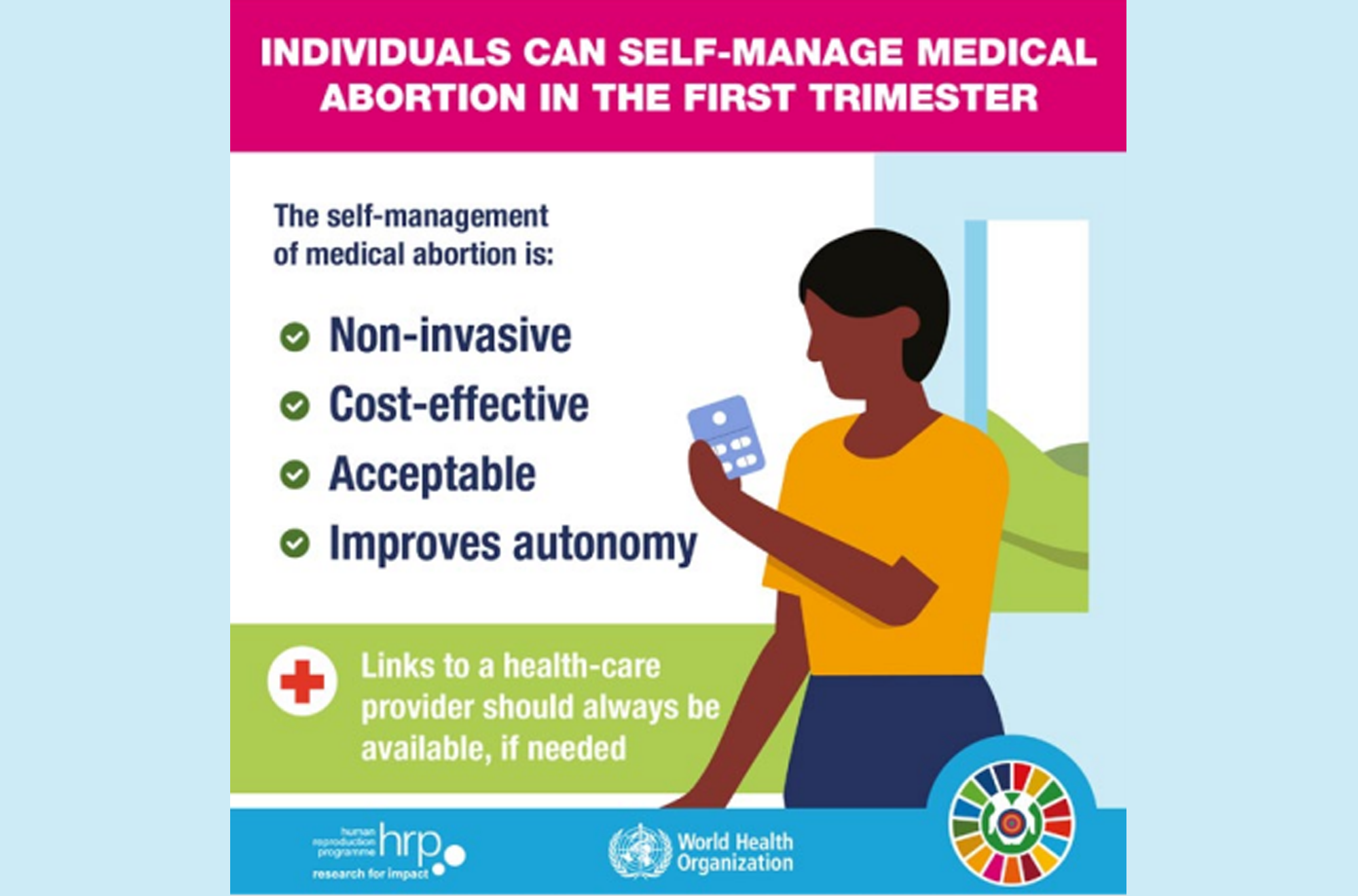
Image: WHO Infographic
The critical role of midwives in safe self-managed abortion
by Meghan Eagen-Torkko, Susan Yanow
Journal of Midwifery & Women’s Health, 2021 (NOT open access)
Abstract
As access to legal abortion in the United States becomes more complex, there is increasing interest in self-managed abortion. Choosing to seek abortion care outside the clinical setting can also help people marginalized or harmed by existing health care systems to access needed care in a way that feels safe and empowering. However, patients and midwives alike often have a lack of information about expected outcomes and potential complications that may arise, as well as how to manage these in a health care system that may make appropriate follow-up difficult to access if needed. This article discusses patient education as a harm-reduction approach, and reviews ways that midwives may strategically and ethically participate in this patient education need. As trusted health care providers who are expert in pregnancy and reproductive health, midwives are ideally positioned to meet patient knowledge needs around self-managed abortion.
+++
It’s not a seven-headed beast”: abortion experience among women that received support from helplines for medication abortion in restrictive settings
by Sarah E Baum, Ana Maria Ramirez, Sara Larrea, Sofia Filippa, Ijeoma Egwuatu, Justyna Wydrzynska, Magdalena Piasecka, Sybil Nmezi, Kinga Jelinska
Health Care for Women International, 6 November 2020 (NOT open access)
Abstract
There are a growing number of abortion helplines where counselors provide person-centered medication abortion services in legally restrictive settings. Few researchers have explored the perceptions and experiences of the people who obtain support from these helplines. Between April and August 2017, we conducted 30 interviews with women who had a medication abortion with support from helpline counsellors in Poland, Brazil, or Nigeria. Before seeking care with the helpline, women often heard negative stories about abortion and faced enacted stigma from the formal healthcare sector, or chose not to seek services from their doctors due to fear of stigmatizing treatment. Conversely, during their care with the helpline counselors, women received clear information in a timely manner, and were treated with kindness, compassion, respect, and without judgment. Many women gained knowledge and understanding of medication abortion, and some gained a sense of community among those who experienced abortion. Helpline models can provide high-quality, person-centered abortion care to people seeking abortions in legally restrictive contexts. Evidence from these service-delivery models could help improve service within the formal healthcare systems and expand access to high-quality, safe abortion by redefining what it means to provide care.
+++
Self-managed abortion: exploring synergies between institutional medical systems and autonomous health movements
by Susan Yanow, Lucía Berro Pizzarossa, Kinga Jelinska
Contraception September 2021;104(3):219-21 (NOT open access)
Abstract
As access to legal abortion in the United States becomes more complex, there is increasing interest in self-managed abortion. Choosing to seek abortion care outside the clinical setting can also help people marginalized or harmed by existing health care systems to access needed care in a way that feels safe and empowering. However, patients and midwives alike often have a lack of information about expected outcomes and potential complications that may arise, as well as how to manage these in a health care system that may make appropriate follow-up difficult to access if needed. This article discusses patient education as a harm-reduction approach, and reviews ways that midwives may strategically and ethically participate in this patient education need. As trusted health care providers who are expert in pregnancy and reproductive health, midwives are ideally positioned to meet patient knowledge needs around self-managed abortion.
+++
Integrating self-managed medication abortion with medical care: a briefing paper
by Global Doctors for Choice, 26 April 2021
Executive summary
This briefing document about self-managed medication abortion (SMMA) offers a framework that emphasizes context and integration of SMMA with medical care. It was written in 2020 by Global Doctors for Choice, an international network of physicians who advocate for reproductive health care and rights. Its primary goal is to provide physicians and other healthcare providers with a synthesis of evidence from around the world to inform their clinical practice and their advocacy. The advent of medication abortion has enabled some women to end their pregnancies with little or no clinician involvement. There are a range of perspectives on self-managed medication abortion. Some emphasize the liberatory advances for women’s autonomy, others are concerned about possible adverse health consequences. Since Global Doctors for Choice supports doctors working in different contexts around the world, this document highlights clinical concerns and advocacy opportunities for clinicians in both low- and high-resource settings, and in places with varying legal and administrative restrictions on abortion. Several recent global developments are salient. During to the Covid-19 pandemic, access to abortion care has been compromised, pushing health systems to adopt more self-managed care options. Over the past several years, medical standard setting bodies have endorsed “patient-centered care,” which is respectful and responsive to patient preferences, needs and values, and supports patient participation in their own care, be it diabetes, asthma, or labor and delivery. Concurrently, distrust and dismissal of science and scientists has surged across a wide range of issues, from climate change, to vaccines, to wearing masks during the Covid-19 pandemic. Global Doctors for Choice asserts the value of medical and public health science and methods, and considers clinicians to be valuable players who meld their evidence based credibility with familiarity with the harms caused by lack of access to care and their fiduciary responsibility to promote patients’ interests.



